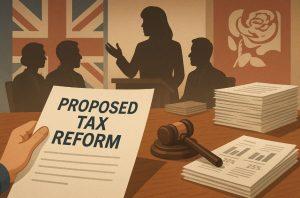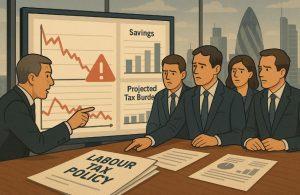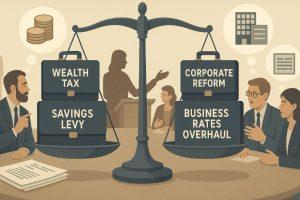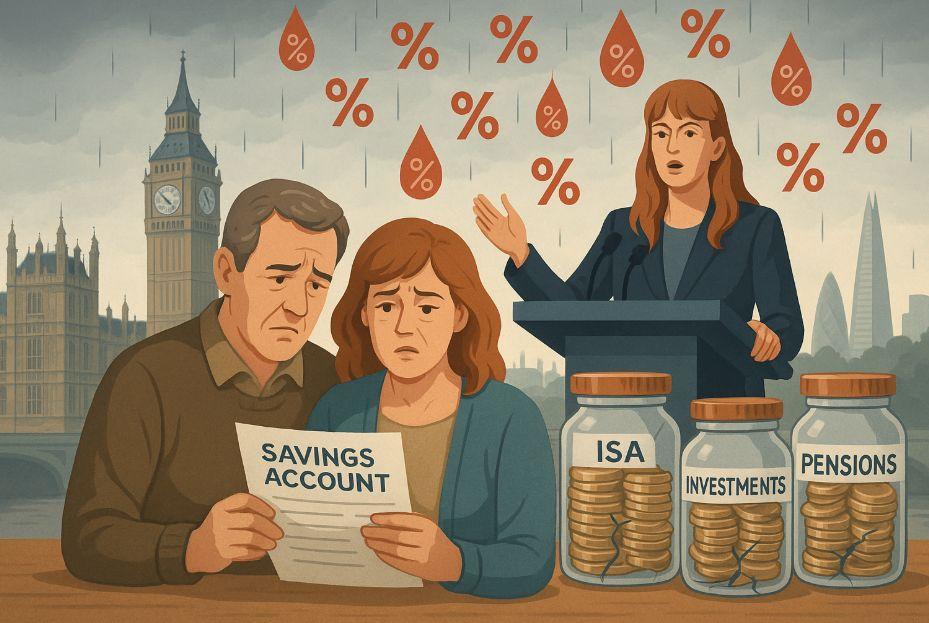Angela Rayner, Deputy Leader of the Labour Party, has found herself at the centre of a contentious debate over proposed tax reforms that could significantly reshape the way British savers manage their finances. With the Labour Party poised for a potential return to power, her fiscal stance has drawn criticism, concern, and cautious optimism in equal measure.
As economic uncertainty and inflationary pressures continue to affect everyday households, Rayner’s approach has sparked questions about fairness, wealth redistribution, and the long-term health of the UK’s investment landscape. For London’s working and middle-class savers, the stakes have never been higher.
This article explores what Angela Rayner’s tax plan entails, who is most likely to be impacted, and how UK savers can prepare.
What Is Angela Rayner’s Proposed Tax Plan?

Angela Rayner, representing the left wing of the Labour Party, has voiced support for a more equitable tax system, focusing on wealth redistribution and fairness. While the full tax plan has not been officially published, several key policy signals have emerged from speeches, interviews, and Labour policy briefings.
Capital Gains and Wealth Tax Adjustments
Rayner and several other Labour figures have expressed openness to increasing Capital Gains Tax (CGT) rates to align them more closely with Income Tax. This could mean investors pay up to 40% on profits from the sale of assets, up from the current basic rate of 10% or higher rate of 20%.
Scrutiny on ISAs and Dividends
Tax-free Individual Savings Accounts (ISAs), long considered a safe haven for UK savers, may face contribution caps or reduced tax privileges, although this remains speculative. There are also discussions about tightening tax rules on dividend income, particularly for those earning passive income through shares.
Reform of Inheritance and Wealth Transfers
Proposals under review include reforms to Inheritance Tax and the closing of loopholes used to transfer wealth tax-free through trusts or asset freezing. Labour believes these practices disproportionately benefit the ultra-wealthy and wants to rebalance the system.
Who Does Angela Rayner’s Tax Plan Affect Most in the UK?
The proposed tax reforms, while positioned as a move towards fairness, would have varied implications across different income brackets and asset holders in the UK.
Impact on Middle-Income Savers
The middle class, particularly in urban centres like London, could see increased tax exposure. These households often rely on ISAs, pensions, and investment portfolios as part of long-term financial planning. If these vehicles lose their favourable tax status, the impact could be significant.
High-Net-Worth Individuals
Labour’s plan is heavily targeted at the wealthy. Those with large portfolios, multiple properties, or complex trust structures would likely face a heavier tax burden under Rayner’s vision. However, critics argue that many of these individuals have the means to navigate or legally avoid new taxes.
Pensioners and Retirees
Retirees dependent on investment income or drawing from tax-sheltered savings accounts could face reduced returns if capital gains or dividend taxes rise. While Labour claims pensioners won’t be directly targeted, indirect effects could be felt.
Could UK Savers See Higher Taxes on Their ISAs and Investments?
One of the key concerns among financial experts and savers alike is the potential taxation of savings vehicles that have long enjoyed tax relief.
ISAs- Under Threat?
ISAs, which currently allow individuals to save up to £20,000 per year tax-free, are under informal review. Labour has not announced plans to scrap ISAs, but there are discussions around reforming the annual allowance or introducing means-testing to limit high-income individuals from fully benefiting.
Capital Gains and Dividend Income
Should CGT be aligned with Income Tax, those realising profits from property, shares, or business investments would see their tax bills rise sharply. For example, a basic-rate taxpayer could go from paying 10% to 20% or even 40% on capital gains.
Why Are Labour’s Economic Plans Raising Concerns Among Financial Experts?

Labour’s intent to promote fairness in the tax system has raised eyebrows among economists and financial institutions.
Risk to Investor Confidence
Leading economists argue that sudden tax hikes on savings could deter investment and reduce capital flow into UK markets. This, in turn, could slow growth, impact job creation, and damage the country’s competitiveness.
Potential for Capital Flight
A sudden clampdown on tax-free investments may drive high-net-worth individuals and companies to relocate assets abroad, seeking more favourable tax regimes.
Unintended Middle-Class Burden
While aimed at the wealthy, several experts warn that middle-income savers could inadvertently bear the brunt of these policies especially in cities like London, where property ownership and savings rates are higher.
Is This a Genuine ‘Tax Raid’ or a Misunderstood Redistribution Strategy?
The term “tax raid” has been widely used in media coverage, often with a political slant. But is it an accurate representation of Labour’s intent?
Redistribution or Punishment?
Supporters argue that the plan is a progressive correction, redistributing wealth to tackle inequality. Critics say it punishes aspiration and targets those who play by the rules by saving and investing for their future.
Comparison to Past Governments
Historical data shows both Labour and Conservative governments have made tax changes affecting savers. However, the scale and timing of Labour’s proposed reforms could mark a significant shift in fiscal policy.
How Might the Tax Policy Shift Impact London’s Working and Middle-Class Households?
For Londoners, who often face higher living costs, property prices, and financial commitments, even marginal tax increases can have outsized effects.
The London Saver Profile
Typical savers in London might have:
- ISAs exceeding £50,000
- Buy-to-let properties or second homes
- Dividend-generating shares or pensions
These profiles would be at higher risk under any tax policy shift involving CGT, ISAs, or dividend income.
Housing and Property Investments
A Labour government could revisit buy-to-let taxation, potentially affecting landlords with modest portfolios. Stamp Duty Land Tax (SDLT) and mortgage interest relief changes may also resurface.
What Are the Alternatives to Angela Rayner’s Approach?

Opposition parties and some economists have proposed different routes to economic equity that may not involve increasing personal taxes.
Closing Corporate Tax Loopholes
One suggestion is targeting corporate tax avoidance instead of individual savers. Increasing enforcement and closing loopholes could recoup billions without affecting household wealth.
Reforming Business Rates
Adjusting the outdated business rate system to focus on digital and multinational businesses could ease pressure on everyday taxpayers and small business owners.
Can UK Savers Protect Their Wealth If These Tax Plans Are Implemented?
While nothing is yet law, it is wise for savers to consider risk mitigation strategies.
Financial Planning Advice
Wealth managers suggest:
- Maximising current ISA contributions before any changes
- Diversifying into tax-efficient investment wrappers
- Reviewing estate plans and pension drawdown strategies
Long-Term Considerations
Adapting to tax policy changes is a part of sound financial planning. The key is staying informed, working with a certified financial planner, and understanding your exposure.
What Happens Next – Will These Tax Policies Become Law?

Angela Rayner’s tax proposals are not yet legislation. However, Labour’s polling lead and manifesto momentum suggest that these ideas could soon become part of official policy.
Timeline for Reform
- Before the General Election: Policy announcements and manifesto finalisation.
- Post-Election (If Labour Wins): Budget review, tax consultations, implementation within 12–18 months.
Voters and savers should monitor party manifestos and upcoming debates carefully.
Potential Changes Under Angela Rayner’s Tax Policy
| Tax Element | Current Policy (2024) | Proposed Changes (Speculative) | Affected Groups |
| Capital Gains Tax (CGT) | 10% basic rate / 20% higher rate | Up to 40% aligned with Income Tax | Investors, landlords |
| ISAs | £20,000 tax-free allowance | Possible means-testing or cap reductions | Middle & high-income savers |
| Dividend Tax | 8.75%–39.35% based on income | Potential rate increase | Shareholders, retirees |
| Inheritance Tax (IHT) | 40% over £325,000 threshold | Closing of trust-based loopholes | High-net-worth families |
Conclusion
While Angela Rayner’s tax ideas are still under political discussion, they represent a meaningful shift toward a more redistributive fiscal strategy. For UK savers especially those in London this could mean rethinking how and where to grow and preserve wealth.
The best course of action for now is to stay informed, explore financial planning options, and pay close attention to how the next election reshapes Britain’s economic future.
FAQs About Angela Rayner’s Tax Plan and Its Impact on Savers
How might capital gains tax change under Labour?
Labour may align CGT with Income Tax, potentially doubling the tax rate for some investors.
Are pension pots at risk from Labour’s proposed tax changes?
While pensions aren’t explicitly targeted, any changes to tax-free drawdown or contribution limits could impact retirees.
What did Angela Rayner actually say about savings tax?
Rayner supports fairer taxation of wealth but has not published detailed savings tax policy yet.
How would these changes affect middle-income Londoners?
Those relying on ISAs, dividends, or rental income could see higher tax bills under proposed reforms.
Could these policies discourage investment in the UK?
Yes, experts warn increased taxes might reduce investor confidence and encourage capital flight.
What is the Labour Party’s official stance on ISAs?
Labour has not committed to ending ISAs but has discussed reforming them for equity.
Are these tax plans already confirmed or still in discussion?
As of now, they are policy suggestions, not confirmed legislation.









Leave feedback about this